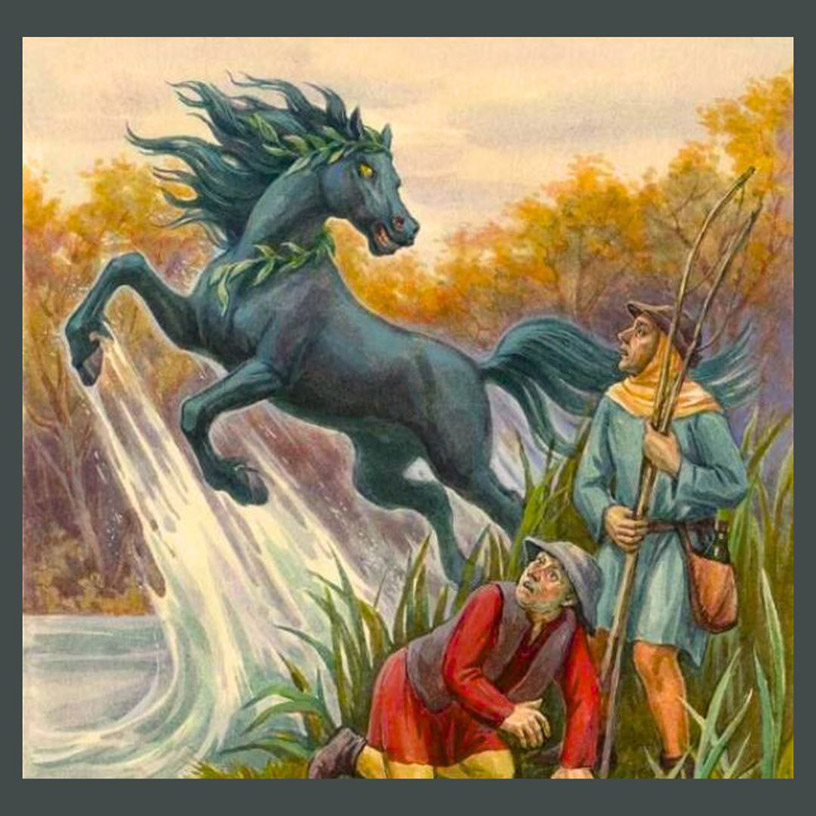The difference between legends and myths is that legends or sagas, tell the stories of heroes and their heroic actions...
No mortal ear could have heard the kelpie passing through the night, its magic hooves were as silent as a dead man's. It would only reveal itself to those who knew it badly.
Old stories can be divided into history, myths, and legends. History describes events we know happened, whereas myths and legends, though often repeated by generation after generation, were never actually proven beyond a shadow of a doubt. The difference between legends and myths is that legends or sagas, tell the stories of heroes and their heroic actions, whereas myths tell the stories of creatures, divine beings, and gods and how they came to be. In this sense, myths are more like fairytales told to young children. Or we think they are fairy tales.
Water plays an important role in many legends and myths. There are mythological water beings and gods, stories of heroes that have something to do with water, and even stories of isles and continents lost below the surface. A kelpie, or water kelpie, is a shape-shifting spirit inhabiting lochs in Irish and Scottish folklore. I would like to tell you about the Kelpies, whose stories I love very much in mythology.

Folklore and mythology are filled with tales of spirits and magical creatures, benevolent and evil alike. But, perhaps none is more vengeful than the kelpies of Scotland. It seems as though the kelpie was made to be an enemy, to man and other magical creatures alike. Typically residing near water, and taking the form of a black horse, the kelpie would lure travelers to their death. Initially appearing peaceful, even docile, travelers would be tempted to ride the quiet horse, to cross a body of water. Once atop the horse’s back, the kelpie would gallop to the deepest end, luring its victims to their deaths and dragging them below water.
The stories of the Kelpie were, perhaps, especially useful in warning children away from riverbanks and strange horses alike. All sorts of trouble could ensue if one were to enter an unknown body of water, much less on top of someone else’s animal. A common identifying characteristic of the kelpie is said to be its hooves, hooves that are reversed when compared to those of a regular horse. Kelpies could also take on a human form, typically that of a man. The anthropomorphised water spirit could also be recognised, like its animal counterpart, not by its legs this time, but by its hair, where algae and seaweed could be found among locks of hair. In some versions of the myth, the kelpie’s supernatural abilities allow it to control and manipulate water, enabling it to submerge its victims against their will.
The origin of these mythical creatures is shrouded in mystery. One theory sees them as later versions of gods and goddesses who in ancient times were associated with particular lochs and rivers. Another sees them as symbols of the real danger posed by deep or fast-flowing water.
My aim was to draw attention to this water creature in mythology, but also to increase the reader's interest in mythology. If it piqued your interest even a little bit, come on and read this short story. Who knows, maybe your imagination will start to create new kelpies in the waters of your own world.
“The moors were dark, a haze rising from the nearby river gave the impression that smoke was rising from some hellish gape in the earth. The man walking the lonely road wished he had some faster way to travel. As if the Folk of the land were listening, a pale, saddled horse appeared near the water. The man approached it, reaching tentatively. The horse’s nicker did not indicate fear but rather sounded like an invitation. Using the saddle horn to pull himself up, the man could not believe his luck. Suddenly the horse burst into a run, heading straight for the river. The terrified man tried to dislodge himself from the horse, but some supernatural force kept him in place. The water didn’t seem to slow the horse its touch seemed to give it speed. The man realized this was no horse at all but a kelpie, just at that moment his head went below the surface, never to return.”
Time had stopped for the traveler. He remained mute and deaf in the dark depths of the water for centuries. He didn't die, but he wasn't alive either. Until one day another kelpie brought it to him.
What could the kelpie have brought to the man? Did he bring someone else or did Kelpie want to do him a favour?
Should I leave the rest to your imagination?
















